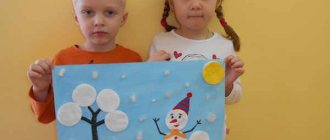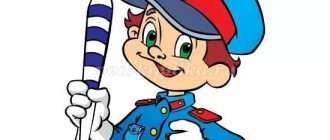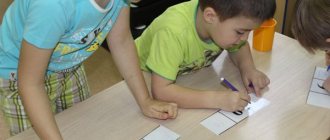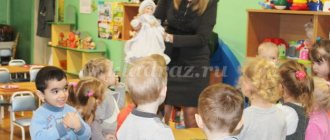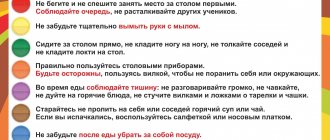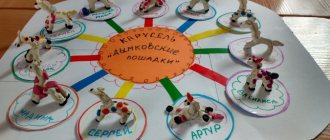Conversation “Sport is life”
Conversation in the preparatory group “Sport is health”
Target
: Formation in children of a conscious attitude towards their healthy lifestyle, accumulation and enrichment of children’s knowledge about the Olympics, improvement of knowledge about various sports, desire to play sports.
Progress of the conversation
:
-Guys, today we will talk about sports. What is sport? Sport is an important part in the life of every person. Even in ancient times, our ancestors took its benefits into their arsenal. The first sport is considered to be wrestling, which originated with cavemen. In Ancient Greece, even then there were a lot of different sports: running, javelin and discus throwing, chariot racing.
Sport is one of the parts of physical education that is aimed at maintaining and strengthening health. Sport involves competitive activity.
Sports can be professional or amateur. Professional sports necessarily require participation in tournaments and competition for prestigious awards. Amateur sport is a sport that a person engages in whenever he wants, choosing absolutely any kind.
Do you know what people who play sports are called? (Athlete)
An athlete is a person who plays one of the sports at a professional or amateur level.
Sports are traditionally divided into winter and summer types.
What winter sports do you know?
(Winter sports include: hockey, figure skating, speed skating, skiing, snowboarding, luge and others.)
-Winter sports are a lot of fun, they will keep you warm even on the coldest day, they perfectly strengthen your immune system, willpower, and develop agility and endurance.
There are also a lot of sports opportunities in summer.
Please name summer sports.
(Summer sports include: cycling, tennis, football, surfing, handball.)
In addition, there are sports that can be practiced all year round: dancing, gymnastics, athletics and weightlifting, swimming, wrestling, acrobatics, equestrianism, fencing, basketball, volleyball. And the beloved and “calm” chess is also a sport!
The world of sports has its own, big and very interesting holiday! And it's called the Olympic Games! Perhaps every professional athlete dreams of becoming an Olympic champion. With due diligence and perseverance, this can be achieved. The Olympic Games are the most serious sports competitions in which professional athletes from all countries participate. Everyone represents their country and shows their skills in one sport or another. Competitions are held every four years. Even simple participation without winning medals is very prestigious!
The history of the Olympic Games originated in Ancient Greece. It was there that the first competitions were held in the city of Olympia. It is not difficult to guess why the games are called Olympic. During the games, all wars stopped, and a temporary truce was declared, which in no case was to be violated. Even bringing weapons into the city was prohibited.
The traditional symbol of the Olympic Games is five multi-colored intertwined rings. They represent the connection and friendship between the five continents of the Earth. Friendship between all people on the planet, unity, regardless of nation and skin color.
Another tradition is associated with the opening of the games: they must play the Olympic anthem and raise the Olympic flag. When the games end, the flag is also ceremoniously lowered and handed over to a representative of the city in which the next Olympic Games will be held.
There is also, filled with symbolism, the Olympic flame. It is lit in the city of Olympia before the start of the competition and is carried by the athletes to the city where the games will be held. Sometimes it is transported by ship. The honorable mission of lighting the fire at the stadium is assigned to one of the famous athletes of the country hosting the Olympic Games this year.
Why is it important to exercise?
After all, sport is a very important thing in a person’s life. It is necessary to practice it from childhood, even if you do not intend to become a professional athlete.
This will help strengthen your immune system. This means you will be less sick and bored at home. When you exercise, all harmful substances leave your body, but your cells are saturated with the oxygen necessary for life and well-being, blood moves through the body faster, which means you can cope with microbial attacks faster.
During physical education, the body intensively produces a substance called endorphin. It is also called the “joy hormone”. Thanks to it, after playing sports you feel cheerful and cheerful. Scientists have proven that physical exercise improves mood.
Playing sports is an excellent opportunity to become stronger, to gain such character traits as are necessary in life, such as hard work, perseverance, responsibility, self-organization, will and determination.
Sport is a great chance to find great friends with whom you can enjoy spending time and sharing your achievements.
In a word, sport is healthy, interesting and important in the life of every person. Even if you don't plan to participate in the Olympic Games, you can always play your favorite sport for yourself and maintain your health and well-being!
Summary of educational activities for speech development. Topic: “Sports and athletes.”
Summary of educational activities for speech development.
Topic: “Sports and athletes.”
Software tasks:
1. Improve children’s knowledge about modern sports and their features.
2. To form in children an idea of the Olympic Games. To consolidate children's knowledge about the sports included in the Winter and Summer Olympic Games.
3. Create in children an idea of the Olympic Games as a peaceful competition for the purpose of physical improvement of people, in which people from all over the world participate.
4. Foster a love of sports in children.
5. Activate children’s vocabulary with words and expressions “sports competitions, regular training, tournament, sports day, championship, Olympics.”
Progress of the lesson.
Educator. Guys, look who came to visit us?
Children. Pinocchio!
Educator. He brought us a tape, let's listen (songs about sports )
. What do you think these songs are about?
(Children's answers.)
Educator. Yes, sport is physical exercise, regular training, sports competitions, achieving high results, the desire to win. Who plays sports?
(Children's answers.)
Educator. That's right, people who play sports are called athletes.
Pinocchio. Am I an athlete?
Educator. No.
Pinocchio. What do you need to do to become an athlete?
Children. Do physical exercise, do exercises, toughen up.
Pinocchio. And if I do all this, will I be accepted as an athlete?
Children. Yes.
Educator. Guys, think about what kind of sports competitions there are.
(Children's answers.)
Educator. That's right, tournaments, sports days, championships, Olympics. Why do you think all these competitions are held?
Children. It’s interesting to watch and root for the athletes.
Pinocchio. Can I answer? They are held to allow athletes to compete.
Educator. Correct, but not only that. These are also holidays for all athletes and fans. What competitions do you think are a holiday for athletes around the world?
Children. Olympics.
Pinocchio. And why?
Educator. What do you guys think?
(Children's answers.)
Educator. That's right, because this is a competition among athletes from all over the world. The championship may take place in one country, but the Olympics brings together athletes from all countries.
Pinocchio. Guys, when we play games, we also compete. So we are Olympians. Yes?
Children. No, because the Olympic Games are held in a certain city, where athletes from all over the world come. At the Olympic Games there are certain rules, there are judges, spectators, and fans.
Educator. Guys, let's remember what sports we know.
(Children's answers.)
Construct for physical education classes in the middle group (4-5 years old)
GAPOU SO "Kamensk-Ural Pedagogical College"
Industrial practice construct PM.01 Organization of events aimed at strengthening
child's health and physical development
students of group 23A, Elizaveta Artemovna Novikova
specialty 44.02.01 “Preschool education”
DOO:
MDOU No. 9
Children's age:
senior group (5-6 years old)
Educators:
Shmidt Marina Aleksandrovna, Voinkova Irina Valerievna
Head of practice:
Artemikhina Ksenia Sergeevna
Educational areas:
"Physical development"
Form of organization of sports and recreational activities:
physical education lesson
Kind of activity:
motor
Forms of organization of activities:
group
Target:
To develop children's interest in a healthy lifestyle, physical education and sports.
Planned result:
| Objectives of physical education classes | Tasks taking into account the characteristics of the group’s students |
| Educational tasks: •instill in children the desire to participate in games with elements of competition, relay races; •to foster in children an interest in physical exercise and the need for physical activity. Developmental tasks: •develop physical qualities in children: general endurance, speed, strength, coordination, flexibility. Training tasks: •learn to climb through a hoop straight and backwards; •learn to jump on two legs moving forward over a gymnastic stick; •learn to throw and catch the ball with both hands; •learn to jump on two legs, moving sideways, over a gymnastic stick; •learn to climb through a hoop sideways. Wellness tasks: •continue to form correct posture; the ability to consciously perform movements. |
List of used literature:
1. Federal state educational standard for preschool education. Order of the Ministry of Education and Science of the Russian Federation dated October 17, 2013 N 1155 2.
2. Resolution of the Chief State Sanitary Doctor of the Russian Federation dated May 15, 2013 N 26 “On approval of SanPiN 2.4.1.3049-13 “Sanitary and epidemiological requirements for the design, maintenance and organization of the operating mode of preschool educational organizations”
3. From birth to school: Approximate basic general education program for preschool education / ed. NOT. Veraksy, T.S. Komarova, M.A. Vasilyeva. – M.: MOSAIKA-SYNTHESIS, 2014. – 304 p.
4. Penzulaeva L.I. Physical education in kindergarten: senior group. - M.: MOSAIC-SYNTHESIS, 2014.-128 p.
Principles of preschool education (FSES):
•Full experience by the child of the childhood stage (preschool age), enrichment (amplification) of child development;
•Building educational activities based on the individual characteristics of each child, in which the child himself becomes active in choosing the content of his education, becomes a subject of education (hereinafter referred to as individualization of preschool education);
